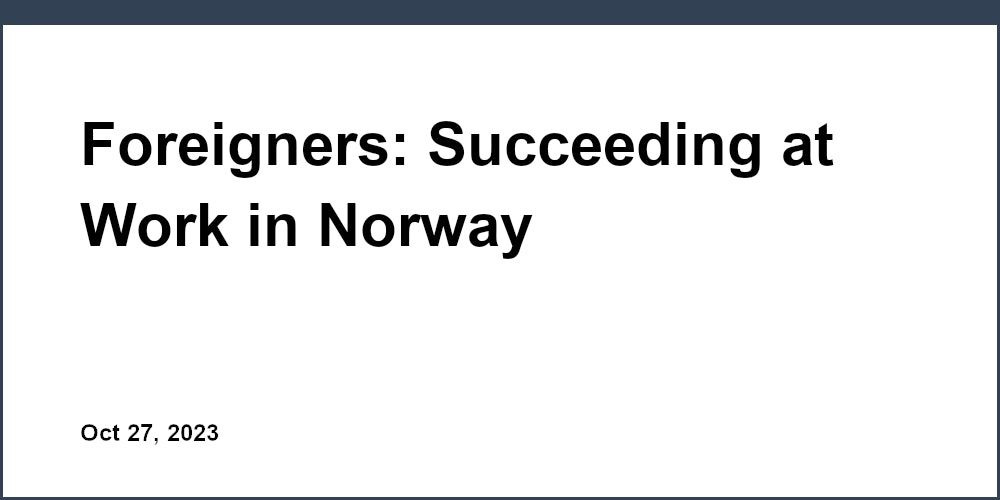Introduction: Adapting to Succeed as a Foreigner in Norway’s Unique Work Culture
Norway’s distinctive work culture presents challenges for newcomers. Mastering unwritten rules and norms is essential to thrive professionally. This insider guide offers practical advice to help foreigners adapt and achieve success. Tips cover communication styles, etiquette, building relationships and understanding business norms. Following this guidance facilitates greater job satisfaction, career growth and cultural integration in Norway. Those preparing for life and work in Norway can gain valuable insights from this content.
Direct Norwegian Communication Styles
Norwegians prefer straightforward communication without small talk. Avoid exaggeration and self-promotion – be humble and matter-of-fact. Listen intently before speaking – pausing shows consideration of others’ words. Honesty is valued while meaningless pleasantries are disliked. Criticism is given plainly without malice – don’t take negative feedback personally.
Written Communication Tips
Emails should be concise, pragmatic and to-the-point. Avoid over-formality – no need for academic language or titles. Prompt replies are valued – don’t wait hours or days to respond. Proofread to avoid careless typos. Avoid ALL CAPS, seen as impolite shouting.
Meeting Etiquette
Meetings start and end promptly – avoid tardiness. Follow agendas precisely – don’t go off topic. Discussion is efficient, not chatty. Decisions are by consensus after considering all viewpoints. Don’t interrupt others – wait your turn.
Reading Between the Lines
If a Norwegian says "that’s interesting", they likely disagree. "I’ll think about it" often means a polite no. Understatements like "not bad" signal being impressed. Pausing before responding indicates careful consideration. Fading follow-up may subtly signify rejection.
Norwegian Workplace Culture and Etiquette
Punctuality is crucial – arrive on time, don’t leave early. Formal business attire is standard, even without client meetings. Work-life balance is valued – avoid unnecessary overtime. Hierarchy is flat with approachable managers. Norwegians avoid conflict and value harmony – stay calm in disputes.
Meetings and Presentations
Thorough preparation and agendas are essential – winging it seems unprofessional. Get to the point without padding. Engage your audience with eye contact. Visual aids should be simple and clear, not busy. Practice a neutral tone, avoid sounding pushy.
Office Policies
Know rules for vacation days and scheduling. Casual dress on Fridays is common. Clean up after yourself in shared kitchens. Follow designated smoking area policies strictly. Gifts are rare – no need for souvenirs from homeland.
Breaks and Lunchtime
Fika coffee breaks encourage socializing with colleagues. Bring lunches avoiding loud or smelly foods. Respect allotted times – don’t be early or late. Clean up after yourself in common areas. Avoid controversial topics like politics and religion.
Building Relationships with Norwegian Colleagues
Focus first on work, then friendships – don’t get too personal too quickly. Patience is needed – relationships take time to build. After work gatherings help bonding – accept invitations. Show interest in Norwegian culture – ask respectful questions about skiing, football, TV shows, authors, family life, and more. Offer help without being pushy or critical.
Appropriate Topics
Outdoor activities, sports, travel, food, cooking, restaurants, cultural events, news, current events – but avoid heated debates.
Inappropriate Topics
Avoid religion, politics, salaries, finances, and controversial issues like immigration unless brought up by a Norwegian first. Also skip comments on appearance and attire.
Personal Space and Gestures
Use a firm handshake with eye contact. Stand 1.5-2 feet apart when chatting. Avoid back slapping or shoulder touching. Don’t stare – briefly look away regularly. Yawning or phone checking are rude during conversations.
Understanding Norwegian Business Culture
Hierarchy is flat – managers are accessible and seek input. Meetings start and end promptly – stick to agendas. Rules and regulations are strictly followed, with thorough reporting requirements. Contracts and agreements are preferred. Negotiating is factual and unemotional – avoid aggressive sales tactics.
Business Dining Etiquette
Breaking bread builds trust but business remains the focus. Arrive on time, don’t linger excessively. Avoid shop talk initially – warm up with small talk first. Don’t talk with your mouth full or eat messily. The senior person typically pays.
Gift Giving Rarities
Gifts are uncommon except small tokens of appreciation. If giving one, choose something useful and moderately priced. Flowers work for a dinner hostess. Quality chocolates or wine from your homeland are suitable. Avoid gifts that could seem like bribes.
Following Up After Meetings
Promptly send minutes and action steps via email. Specify tasks and deliverables. Provide timelines for next steps. Ask clarifying questions if confused – don’t stay silent. Send a separate note thanking them for their time.
Tips for Foreign Job Seekers in Norway
Have a strong LinkedIn profile – Norwegians evaluate candidates online. Get involved in organizations and events before applying. Understate achievements on your CV – avoid boastfulness. Prepare for behavior-based interview questions about past performance. Send thank you notes after interviews.
Acing the Job Interview
Dress professionally with minimal accessories. Arrive 5-10 minutes early – lateness makes a poor impression. Greet with confident handshake and eye contact. Listen closely and pause before responding. Keep neutral facial expressions – avoid nervous tics. Research the role, company mission and how you fit.
Salary and Benefit Negotiations
Know average salaries for your role before discussing pay. Highlight your value proposition rather than make demands. Ask about standard benefits – vacation, insurance, parental leave. Norwegians value work-life balance.
Resigning Gracefully
Review your notice period for resigning. Resign in person – don’t just email. Give an honest reason while remaining diplomatic. Offer transition help and to finish important projects. Express gratitude for opportunities.
Conclusion and Key Takeaways
Grasping cultural contexts is vital for foreigners to succeed in Norway. Directness, formality and punctuality are highly valued. Building trust requires patience – prioritize work before friendships. Avoid faux pas by following tips for workplace conduct, meetings and business relationships. Adapting while retaining your identity leads to mutually beneficial cultural exchange. Those preparing for work and life in Norway can gain valuable cultural know-how from resources providing practical tips and training.
